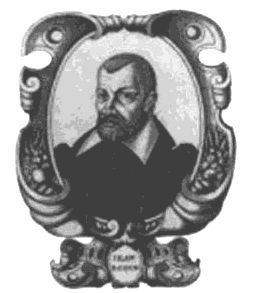| Profile | Major Works | Resources |
Jean Bodin, 1530-1596

Jean Bodin (or Baudin or Bodinus) was a 16th Century French jurist, natural law philosopher and precursor of Mecantilism.
Born in Angers to a prosperous artisan family of Jewish origins, Jean Bodin studied and taught Roman law at the university in Toulouse (around the time when Navarrus was there), before becoming a lawyer in Paris around 1561. Yet Bodin was no stale professional. He had a varied and insatiable intellectual curiosity, reading practically everything he could get his hands on. His first love, history, led to his 1566 tract on the philosophy of history.
Bodin's interest in economics was provoked by Malestroict writings, which laid forth the standard argument that the Europe-wide inflation raging at the time was due to debasement of currency and clipping. In his 1568 tract, Bodin did not dispute that these activities could cause inflation, but Bodin wanted to pin the blame on the Peruvian silver pouring into Europe through Spain. Bodin noticed that clipping, debasement and imports of silver had a common feature: they all increased the amount of money relative to goods. Consequently, Bodin put forth what is generally acknowledged as one of the first statements of the Quantity Theory of Money, detailing the relationship between price levels and the money supply, generally speaking.
Because money flows in the opposite direction of goods, Bodin recognized that exports of goods increased prices while imports lowered them. Thus, the quintessential Mecantilist foreign trade policy formula was already implicit in Bodin's work: if you want to bring prices up, run a favorable balance of trade. Bodin himself was generally favorably-disposed towards free trade, believing it stabilized prices, helped bring nations together and promoted peace. Bodin also articulated a plan for a government-run commodity buffer stock scheme to stabilize wheat prices and an international agreement for monetary standards. He was, however, completely opposed to the lifting of the ban on usury.
In 1571, Bodin entered the service of the king's brother, the Duke of Alençon (later Anjou), and accompanied him to England (it was in the court of Queen Elizabeth I that Bodin was almost made a jester). In 1576-7, Bodin served as a delegate of the Third Estate in the Estates-General of Blois. Bodin threw his political lot in with Michel d'Hôpital, whose politiques faction was trying to construct a "third way" between the extremists of the Catholic Holy League and the Calvinist Union. Bodin urged for negotiations with the Calvinists rather than resumption of the religious wars and he opposed the sale of the monarchy's lands to raise funds for any such endeavor.
It was during the height of his active political involvement that Bodin composed his celebrated Six Books (1576), wherein he expounded his famous theory of sovereignty, which were in many ways consonant with the political positions he had expounded at the Estates-General. In 1580, he wrote a demonology "handbook" for judges at witchcraft trials.
However, Bodin badly misjudged the fanatical spirit of the time. The religious wars were stepped up and the politiques, Bodin included, were squeezed out of royal favor. In the political whirlwind which followed, Bodin was accused of atheism (not unlikely -- he embraced a kind of rational spiritualism in his posthumously published 1588 tract). Bodin decided to duck the whole tumult by quietly retiring to a prosecutorship in Laon in 1583. However, in 1588, after Catholic troops captured the town, Bodin prudently switched his allegiance to the Holy League. He welcomed the ascendancy of Henry IV and the restoration of the politiques in 1594 -- but, now, being officially in with the fanatics, Bodin was not asked to return. He died of the plague in Laon.
|
Major Works of Jean Bodin
|
|
HET
|
|
Resources on Jean Bodin
|
All rights reserved, Gonçalo L. Fonseca
